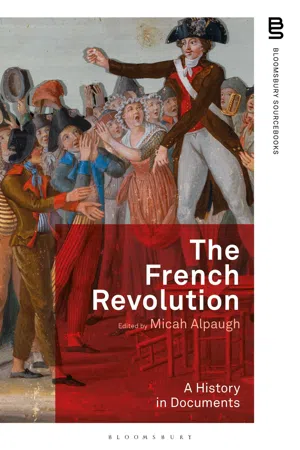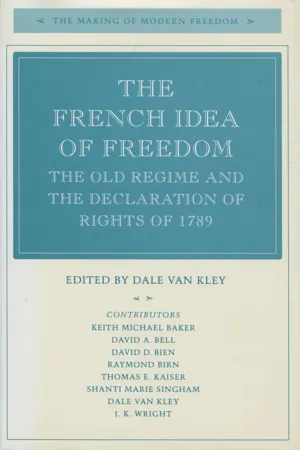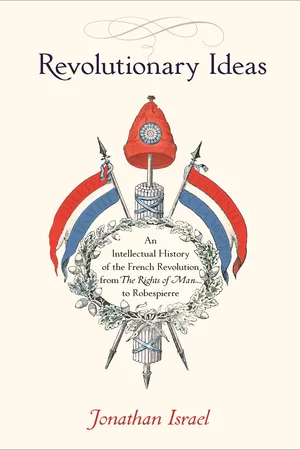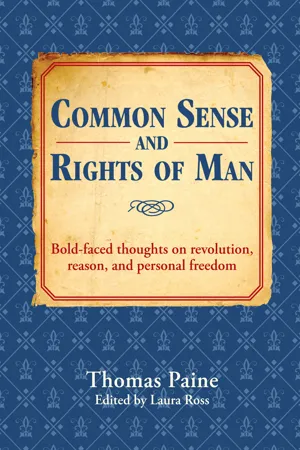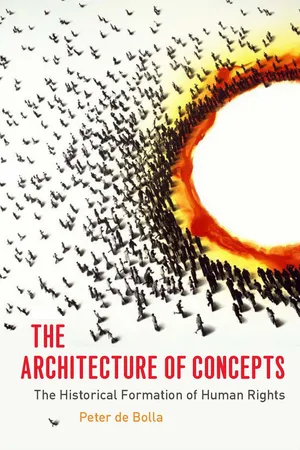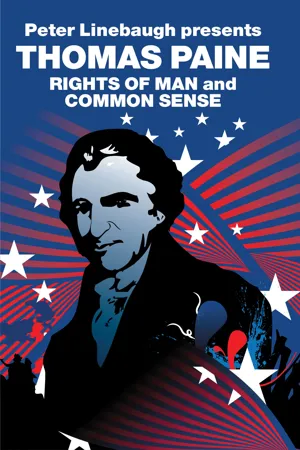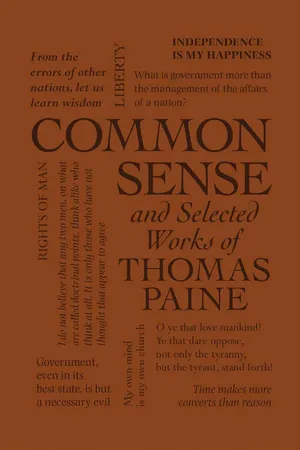History
The Declaration of the Rights of Man
"The Declaration of the Rights of Man" was a document adopted during the French Revolution in 1789. It outlined the fundamental rights and freedoms of individuals, emphasizing principles of liberty, equality, and fraternity. The declaration served as a key milestone in the development of modern human rights and influenced subsequent constitutional and legal developments around the world.
Written by Perlego with AI-assistance
Related key terms
Related key terms
1 of 4
Related key terms
1 of 3
10 Key excerpts on "The Declaration of the Rights of Man"
- eBook - ePub
- Micah Alpaugh, Micah Alpaugh(Authors)
- 2021(Publication Date)
- Bloomsbury Academic(Publisher)
They are very Angry with me for Having supported the Motion Against the Coming of the troops. If they take me up You Must Claim me as an American citizen. . . .Declaration of the Rights of Man and Citizen , August 26, 1789No document embodied the French Revolution’s universalist hopes better than The Declaration of the Rights of Man and Citizen. The first portion of France’s inaugural constitution, designed to provide the principles for its contents, the constitution declared its basis to be not historical precedent (as English and American declarations largely justified themselves) but rather natural right. By declaring “All men are born and remain free and equal in rights,” revolutionaries created a new inclusive ideal of human rights—though one not easily applicable to their colonies, where hundreds of thousand s remained enslaved. Moreover, the document emboldened citizens to defend their rights, making “resistance to oppression” expressly protected should other portions of the document (including free association, speech and press) be infringed. Though buttressed by other articles demanding obedience to the law and submission to the general will, revolutionaries trumpeted the achievement of core rights applicable to all. When the United Nations adopted a global Declaration of Human Rights in 1948, they took France’s 1789 declaration as their model.The French People’s representatives, constituted in the National Assembly, considering that ignorance, forgetting or contempt for the rights of man are the sole causes of public misfortune and the corruption of governments, have resolved to expose in a solemn Declaration, now presented to all the members of the social body, ceaselessly recalling to them their rights and duties, to the end that the acts of the legislative power, and those of the executive power, can be at each instant compared with the goal of all public institutions. Thereby, they will become more respected, to the end that the reclamations of citizens, founded from this point forward on simple and incontestable bases, will always turn to the maintenance of the constitution and the happiness of all. - eBook - ePub
The Making of Modern Freedom
The Old Regime and the Declaration of Rights of 1789
- Dale Van Kley, Dale Van Kley, Dale Van Kley(Authors)
- 1995(Publication Date)
- Stanford University Press(Publisher)
Before proceeding, a word about the ideas in The Declaration of the Rights of Man and of the Citizen, or at least my understanding of what those ideas are. Briefly, three principles form the essence of the Declaration: equality is one, and the two others are conceptions of liberty—first, liberty as protection from authority, the freedom to think and do what one wants, the guarantee of independence; and then, liberty as participation, as sharing in sovereignty and the general will, and in the making of law. Liberty as protection against authority appears in ten of the Declaration’s seventeen articles (2, 4, 5, 7-11, 16, 17), liberty defined as participation in four articles (3, 6, 14, 15), and equality also in four (1, 6, 13, 14). The three principles fitted together more easily than one might think, and together they formed the package, democracy.I
The Feudal Background
Curious though it may seem, the place to begin the search for democracy’s origins is with its supposed opposite in 1789, that is, with feudalism and its legacy. Within feudalism can be found the three main ideas of The Declaration of the Rights of Man.As we know, feudalism came from the joining of two institutions, vassalage and the fief.1 Vassalage was the honorable tie of personal dependency that linked unequal but free men within a narrow elite. It was spread through the top stratum of society first by the initiative of Carolingians desiring to administer an empire, and then by initiatives from below when disorders and local warfare forced many of the remaining independent landowners to look for protection. The fief was the temporary grant to a vassal of the use of land and the revenues of a lesser jurisdiction, this to sustain the follower and to permit him to provide full-time service to his lord. A momentous change came when, in the tenth and eleventh centuries, the fief ceased to be a temporary grant, revocable, essentially the property of the lord, and largely entered instead into the patrimony of the vassal. The change occurred unnoticed in that non-literate society where law was custom, and where the person or family that exercised some function or occupied one or another piece of land was presumed to have done it forever and therefore to have the right to continue to do it forever. It was a society that did not accept change, one where the definition of bad law was innovation. But it was also a society that changed with surprising speed precisely because illiterate. In the absence of written documents, the archives existed only in minds and memories (short because lives were short). Thus, when for practical reasons or even from accident something new was done, it was easy to suppose that it must always have been done. No document proved the reverse. Ad hoc - eBook - ePub
Revolutionary Ideas
An Intellectual History of the French Revolution from The Rights of Man to Robespierre
- Jonathan Israel(Author)
- 2014(Publication Date)
- Princeton University Press(Publisher)
In the crucial vote on 19 August, 620 deputies voted for Mirabeau’s formulation, 220 for Sieyès’s second draft, and, despite Lally-Tollendal’s pleas to cut the metaphysics, only 45 for Lafayette’s. 52 Finalized on 26 August, the Rights of Man and the Citizen envisaged society’s renewal on a completely fresh basis, not one supposedly inherent in the nation’s legal past (as with the American Declaration). 53 Where the American Declaration declares natural rights inherent in British constitutional liberties, the French Declaration invokes rights enshrined in laws yet to be made. The Assembly, Mirabeau, Condorcet, and Volney felt, had in some degree “disfigured” the outcome by qualifying freedom of thought and the press. 54 Even so, the result was a stunning success for Mirabeau, Sieyès, Volney, Brissot, Condorcet, Destutt de Tracy, Pétion, Rabaut, and, generally, the radical bloc. For the first time in history, equality, individual liberty, the right to equal protection by the state, and freedom of thought and expression were enshrined as basic principles declared inherent in all just and rational societies. The bedrock of democratic modernity was in place. The rights the French adopted for themselves were proclaimed universal rights belonging equally to all of whatever nation, station, faith, or ethnicity. It was undeniably Mirabeau and, outside the Assembly, also Brissot, observed Carra, who eclipsed everyone else in securing the Declaration, the new revolutionary creed: “the nation owes each a fine civic crown.” 55 Of course, most contemporaries had little inkling of the republican, democratic, and Radical Enlightenment motivation that shaped this result. American independence “opened our eyes about the true destiny of peoples,” their “natural rights, and the equality of everyone’s rights,” acknowledged Carra in October, confident the entire world would be transformed by the principle of human rights based on equality - eBook - ePub
Common Sense and Rights of Man
Bold-faced thoughts on revolution, reason, and personal freedom
- Thomas Paine(Author)
- 2011(Publication Date)
- Union Square & Co.(Publisher)
RIGHTS OF MAN (1791 )Passage contains an image BEING AN ANSWER TO MR. BURKE’S ATTACK ON THE FRENCH REVOLUTION.1791 PART THE FIRST
TO GEORGE WASHINGTON PRESIDENT OF THE UNITED STATES OF AMERICASIR, I present you a small treatise in defense of those principles of freedom which your exemplary virtue hath so eminently contributed to establish. That the Rights of Man may become as universal as your benevolence can wish, and that you may enjoy the happiness of seeing the New World regenerate the Old, is the prayer ofSir, Your much obliged, and Obedient humble servant,THOMAS PAINEPassage contains an image
Preface to the French EditionThe astonishment which the French Revolution has caused throughout Europe should be considered from two different points of view: first as it affects foreign peoples, secondly as it affects their governments.The cause of the French people is that of all Europe, or rather of the whole world; but the governments of all those countries are by no means favorable to it. It is important that we should never lose sight of this distinction. We must not confuse the peoples with their governments; especially not the English people with its government.The government of England is no friend of the revolution of France. - eBook - ePub
The Architecture of Concepts
The Historical Formation of Human Rights
- Peter de Bolla(Author)
- 2013(Publication Date)
- Fordham University Press(Publisher)
I am not suggesting, for example, that Paine either invented or consciously invoked the concept of “rights of man” as I have been developing it over the last three chapters. Nor do I want to suggest that Paine had no use for the counterconcept of “right(s).” In fact, following the French Declaration of the Rights of Man and Citizen, which explicitly treats the rights of man as countable and specifiable, as structured through the element of the deposit, based upon the concept “right(s),” discussion of the topic of rights in Britain regularly invoked the trinity of life, liberty, and property. 79 And in doing so it was, of course, fully immersed in a very long-standing tradition in which rights were understood to have a legal basis, precisely in a claim or a title. As has been noted in previous chapters, this tradition was developed to a considerable degree in the ethical project of natural law and conceived of such claims as having corresponding obligations: Rights always come hand in hand with duties - eBook - ePub
- Carine Lounissi(Author)
- 2018(Publication Date)
- Palgrave Macmillan(Publisher)
Rights of Man was to defend the French system even if it meant avoiding problematic issues. If one considers the popular British readership that Paine was targeting, this lack of criticism can be easily explained by his wish to show how a successful revolution which had clearly led to a rejection of the hereditary principle of political and social domination could take place without leading to chaos. The kind of hybrid system which was to be set up in 1791 matched what the reformed British monarchy could be. The theoretical outlook of the Revolution of 1789 corresponded to what Paine viewed as a legitimate revolution.If one then tries to elucidate the same issue when taking the educated readers as Paine’s other potential addressees, the interpretation of this silence is more complex. French, American and English educated readers were likely to construe Paine’s arguments in a different way according to their own political contexts and partisanships. In France, there was no talk of an abolition of monarchy in the spring of 1791, even by future radicals such as Robespierre who would not support this abolition during the Varennes crisis, following the King’s failed escape a few months later in June 1791, during which a handful of ‘republicans’ called for a reform of the executive power, including Paine, Condorcet , Brissot and Robert. Paine’s commitment to republican government then confirms the thesis of a manipulation in the first part of Rights of Man . In England, none of Burke’s opponents criticized the monarchical part of the French system. Neither did Burke who in his Letter to a Member of the National Assembly had stressed the contradiction there was in maintaining the King on the throne and in reducing his power to what he viewed as a symbolic function. In the United States, I did not find any discussion of this in the articles I found which discussed the content of Rights of Man .103 - eBook - ePub
Intercultural Constitutionalism
From Human Rights Colonialism to a New Constitutional Theory of Fundamental Rights
- Salvatore Bonfiglio(Author)
- 2018(Publication Date)
- Routledge(Publisher)
Rights of Man, its main adversaries were not so much the French revolutionary theorists, but Burke’s English henchmen.Likewise, post-revolutionary work is supported by the fact that the 1789 Declaration concluded a subjective process of natural law theory, so that a constant, and essentially bipolar, dialectic between authority and freedom emerged. After the French revolution, policies that favoured the universal recognition of rights prevailed in the nineteenth century. This was balanced out by the effective primacy of the executive branch over the legislative branch, despite favourable theorization towards the latter, which imposed some limits on the exercise of fundamental freedoms.Analysis of the constitutions of the Napoleonic period confirms that rights related to liberty were not included, with the exception of the Additional Act to the Constitutions of the Empire (also known as the Charter of 1815), which the liberal Constant41 helped to draft. In addition, the Napoleonic Criminal Code of 1810 established an extension of death penalty cases, a hardening of criminal theory against the State and a general increase in the scope of criminal sanctions.Not surprisingly, the aforementioned trend coincides with the emergence of the concept of public order and its inclusion, for the first time, in the Napoleonic Code – the true constitution of the then-triumphant bourgeois class. The concept was mentioned, but not defined, acquiring a rather vague nature. This is arguably still the case today, as it is often attributed a multiplicity of meanings, including the notion of (public) security and its ‘protective’ function against ‘internal enemies’ and, against ‘external enemies’ in the case of other legal systems. Public order was directed, in this case, towards the restoration and defence of the legal order and property, as a supreme value. - eBook - ePub
Tom Paine
The Greatest Exile
- David Powell(Author)
- 2019(Publication Date)
- Routledge(Publisher)
9 RIGHTS OF MANThe winter of 1790 was mild, and Paris was quiet again. Each morning, Louis and Marie Antoinette walked in the garden of the Tuileries flanked by grenadiers and an officer of the National Guard. Each evening, The Barber of Seville played to full houses of theatre-goers, whilst throughout the day the talk in the cafés of the Palais Royale and Place Vendôme was of politics, and yesterday’s business at the National Assembly.Since moving into the capital from Versailles in October, the Assembly had been meeting in a riding school built for the young Louis XV; an uncomfortable place, ill lit and heated by a single stove modelled on the Bastille set in the middle of the floor. The proceedings were always noisy, with several speakers often on their feet at the same time; sometimes wild, the public gallery pelting the deputies below with oranges and apples. For all this, the Assembly and its 31 Standing Committees were slowly hammering out a body of legislation that would make a reality of The Declaration of the Rights of Man.Superficially, at least, it seemed that the transfer of power was progressing smoothly enough, though the deputies of the Assembly were fully aware not only of the fickleness of the public mood, but also of the danger of counter-revolution. In public, Louis might appear amenable to the new order and be pleased to call himself ‘King of the French’. Too often, however, he forgot the caveat: ‘by the grace of God and the constitutional law of the state.’ Prompted by Marie Antoinette, the man still hankered after his lost absolutism, and only recently had been heard to remark: ‘I would rather be King of Metz, than continue to be King of the French.’There was no mistaking his meaning. Under the Marquis de Bouille, a royalist army lay just across the frontier. Once there, he could call up the support of both Spain and Austria. As was so often the case, however, Louis equivocated, whilst royalists made a mare’s nest of plots — of a march of eight hundred from Versailles to free the King; of English funds promoting unrest in Britanny; of the plan of the Marquis de Favras to assassinate Lafayette. On 14 January 1790, that indefatigable traveller, Arthur Young, was writing in his diary: - eBook - ePub
- Thomas Paine, Jessica Kimpell(Authors)
- 2020(Publication Date)
- Verso(Publisher)
RIGHTS OF MANPassage contains an image
RIGHTS OF MAN,PART THE FIRST
BEING AN ANSWERTO MR. BURKE’S ATTACKON THE FRENCH REVOLUTION1 1791
Passage contains an image
To GEORGE WASHINGTON
President Of The United States Of America2
SIR,I present you a small Treatise in defence of those Principles of Freedom which your exemplary Virtue hath so eminently contributed to establish. That the Rights of Man may become as universal as your Benevolence can wish, and that you may enjoy the Happiness of seeing the New World regenerate the Old, is the Prayer ofSIR, Your much obliged, and Obedient humble Servant, THOMAS PAINEPassage contains an image
PREFACE TO THEENGLISH EDITION
From the part Mr. Burke took in the American Revolution,3 it was natural that I should consider him a friend to mankind; and as our acquaintance commenced on that ground, it would have been more agreeable to me to have had cause to continue in that opinion than to change it.At the time Mr. Burke made his violent speech last winter in the English Parliament against the French Revolution and the National Assembly, I was in Paris, and had written to him but a short time before to inform him how prosperously matters were going on. Soon after this, I saw his advertisement of the Pamphlet he intended to publish: As the attack was to be made in a language but little studied, and less understood, in France, and as everything suffers by translation, I promised some of the friends of the Revolution in that country that whenever Mr. Burke’s Pamphlet came forth, I would answer it. This appeared to me the more necessary to be done, when I saw the flagrant misrepresentations which Mr. Burke’s Pamphlet contains; and that while it is an outrageous abuse on the French Revolution, and the principles of Liberty, it is an imposition on the rest of the world.I am the more astonished and disappointed at this conduct in Mr. Burke, as (from the circumstances I am going to mention), I had formed other expectations. - eBook - ePub
- Thomas Paine(Author)
- 2014(Publication Date)
- Canterbury Classics(Publisher)
modus vivendi with the existing order, as he was willing to retain Louis XVI as head of the executive in France: Burke resisted every tendency of English statesmanship to reform at home, or to negotiate with the French Republic, and was mainly responsible for the King’s death and the war that followed between England and France in February, 1793. Burke became a royal favorite, Paine was outlawed by a prosecution originally proposed by Burke. While Paine was demanding religious liberty, Burke was opposing the removal of penal statutes from Unitarians, on the ground that but for those statutes Paine might some day set up a church in England. When Burke was retiring on a large royal pension, Paine was in prison, through the devices of Burke’s confederate, the American Minister in Paris. So the two men, as Burke said, “hunted in pairs.”So far as Burke attempts to affirm any principle he is fairly quoted in Paine’s work, and nowhere misrepresented. As for Paine’s own ideas, the reader should remember that “Rights of Man” was the earliest complete statement of republican principles. They were pronounced to be the fundamental principles of the American Republic by Jefferson, Madison, and Jackson, the three Presidents who above all others represented the republican idea which Paine first allied with American Independence. Those who suppose that Paine did but reproduce the principles of Rousseau and Locke will find by careful study of his well-weighed language that such is not the case. Paine’s political principles were evolved out of his early Quakerism. He was potential in George Fox. The belief that every human soul was the child of God, and capable of direct inspiration from the Father of all, without mediator or priestly intervention, or sacramental instrumentality, was fatal to all privilege and rank. The universal Fatherhood implied universal Brotherhood, or human equality. But the fate of the Quakers proved the necessity of protecting the individual spirit from oppression by the majority as well as by privileged classes. For this purpose Paine insisted on surrounding the individual right with the security of the Declaration of Rights, not to be invaded by any government; and would reduce government to an association limited in its operations to the defence of those rights which the individual is unable, alone, to maintain.From the preceding chapter it will be seen that Part Second of Rights of Man
Index pages curate the most relevant extracts from our library of academic textbooks. They’ve been created using an in-house natural language model (NLM), each adding context and meaning to key research topics.
Explore more topic indexes
Explore more topic indexes
1 of 6
Explore more topic indexes
1 of 4
